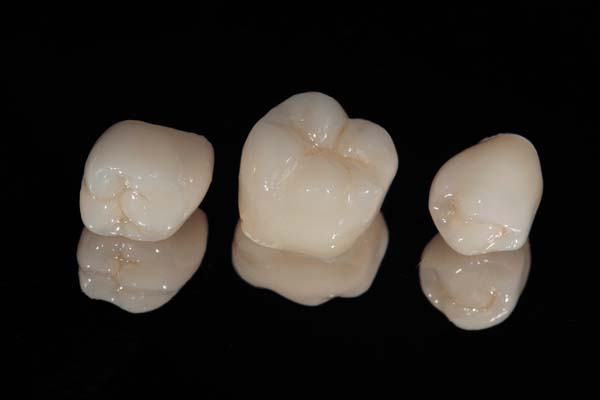4 Questions to Ask About Dental Crowns

Are you considering getting dental crowns? Before moving forward, you need to ask your dentist some questions. This will help you understand the procedure and what to expect when it is over. Then you will have the information you need to make an informed decision about dental crowns.
Questions to ask about dental crowns
Getting crowns is a huge decision. Patients should ask four key questions before a crown procedure. The dentist can help provide these patients the right answers. Patients can bring these questions along with them during a trip to the dentist.
1. Why is a crown necessary?
Dentists recommend crowns when teeth have been severely damaged and require support. This procedure is also used to restore worn-down teeth. Crowns can repair discolored or misshapen teeth. These restorations allow the patient to have a new smile.
Patients should find out the reason for the crown. During this discussion, patients can also talk about other treatment options, if any are available. If the tooth is in poor shape, a crown is likely the only option. However, if the tooth is still salvageable, the dentist might recommend a less invasive method to restore it.
2. What materials are available?
Crowns are available in various materials, including ceramic, porcelain-fused to metal, gold alloys, and base metal alloys. Dentists help patients choose the right material for their needs. For example, if the crown is for the front tooth, the dentist might recommend an all-ceramic crown. If it is needed for a back tooth, a porcelain-fused to metal crown might be the right choice. The dentist might also recommend gold or metal alloys for the back teeth.
3. How long will the crown last?
Crowns last an average of 10-15 years but often last much longer. In fact, some people keep crowns for their entire lives. While it is impossible to predict exactly how long the crown will last, dentists can give patients estimates. The estimate will be based on the material and the location of the crown. Dentists also provide information to help people extend the life of the crown.
4. What does the process involve?
It is always wise to ask dentists about the crown placement process before undergoing the treatment. Crowns take two appointments to place. During the first appointment, the dentist prepares the tooth and takes impressions. The dentist fits a temporary crown during this appointment.
The temporary crown is removed, and the permanent crown is placed during the second appointment. Dentists make sure the crown is properly fitted and make in-office adjustments if needed. While that is a basic overview of the process, dentists can provide additional information to patients. Dentists can go through the process step by step, so patients have a full understanding of what will occur.
Caring for dental crowns
Proper care and maintenance can help prolong the lives of dental crowns. Brushing the teeth at least two times a day for two minutes each time and flossing before bed are ideal dental care habits to maintain. The patient may need toothpaste for sensitive teeth. Using antibacterial mouthwash can help reduce plaque and cavity formation.
Avoid chewing hard and chewy foods. Doing so can prevent damaging and dislodging the crowns. Flossing before bed can remove food particles between teeth. Keeping oneself from grinding teeth. Wearing a nightguard at night can prevent cracks from developing.
People who need dental crowns
Adults, teens, and kids can have dental crowns. Severe dental pain or damage will need a checkup. Then, the dentist will determine if the patient needs crowns. Here are the situations that need crowns:
- Cosmetic modification
- Broken tooth restoration
- Support and cover teeth with large fillings
- Protect weakened teeth
- Cover an implant
- Hold a cracked tooth together
- Keep a dental bridge in place
The process
Preparing the teeth for dental crowns is necessary. The dentist will take dental impressions of the patient’s natural teeth. The mold will help create the custom crowns. Then, the dentist will reshape the teeth first. This will help the crowns fit over the treated teeth. It will also roughen the dental surfaces. The rough surface will make the crowns stick to the teeth better.
After the reshaping, the dentist will take impressions of the reshaped teeth. Doing so will help make the crowns fit well. The dentist will give the patient temporary crowns to wear until the permanent crowns are ready. The patient will return to the clinic to have a fitting. The dentist can make necessary adjustments so that the patient can go home with new teeth.
Talk to your dentist about dental crowns
Your dentist wants you to be involved in the treatment process. That includes asking questions related to the treatment. During your consultation, ask the dentist as many questions as you would like. However, be sure to ask why you need the crown, what materials the dentist recommends, how long the restoration will last, and what the process involves. Then you will be ready to take the next step in the process.
Request an appointment here: https://www.stluciedentist.com or call St Lucie Center for Cosmetic Dentistry at (772) 878-5000 for an appointment in our Port St. Lucie office.
Check out what others are saying about our dental services on Yelp: Dental Crowns and Dental Bridges in Port St. Lucie, FL.
Related Posts
Dental crowns are a great way to repair teeth that are damaged by decay or dental trauma, and they are commonly used for a variety of other purposes as well. While many are familiar with what dental crowns are, it can be helpful to understand exactly how they are bonded to a tooth, particularly if…
Cosmetic Crowns are crowns that are done mostly for cosmetic purposes and not necessarily medically necessary due to decay. Many people choose cosmetic crowns to renew their smile and gain confidence. Cosmetic crowns take into account aesthetics of the smile and often deal with the front teeth. For this reason your cosmetic dentist at St.…
A crown or "cap" is needed when a large cavity or decay is too extensive and compromises the integrity of the tooth structure beyond the point of a simple filling. Crowns can also be needed when an old amalgam (metal filling) expands and breaks the tooth. When this occurs the remaining tooth structure will need…
How we treat a broken or chipped tooth depends on how severely it is damaged. If a small piece has broken off, the chipped tooth repair can usually be completed with one office visit. A badly damaged or severely broken tooth may require longer treatment or a more costly procedure. Dr. Almanzar’s solutions for chipped…





